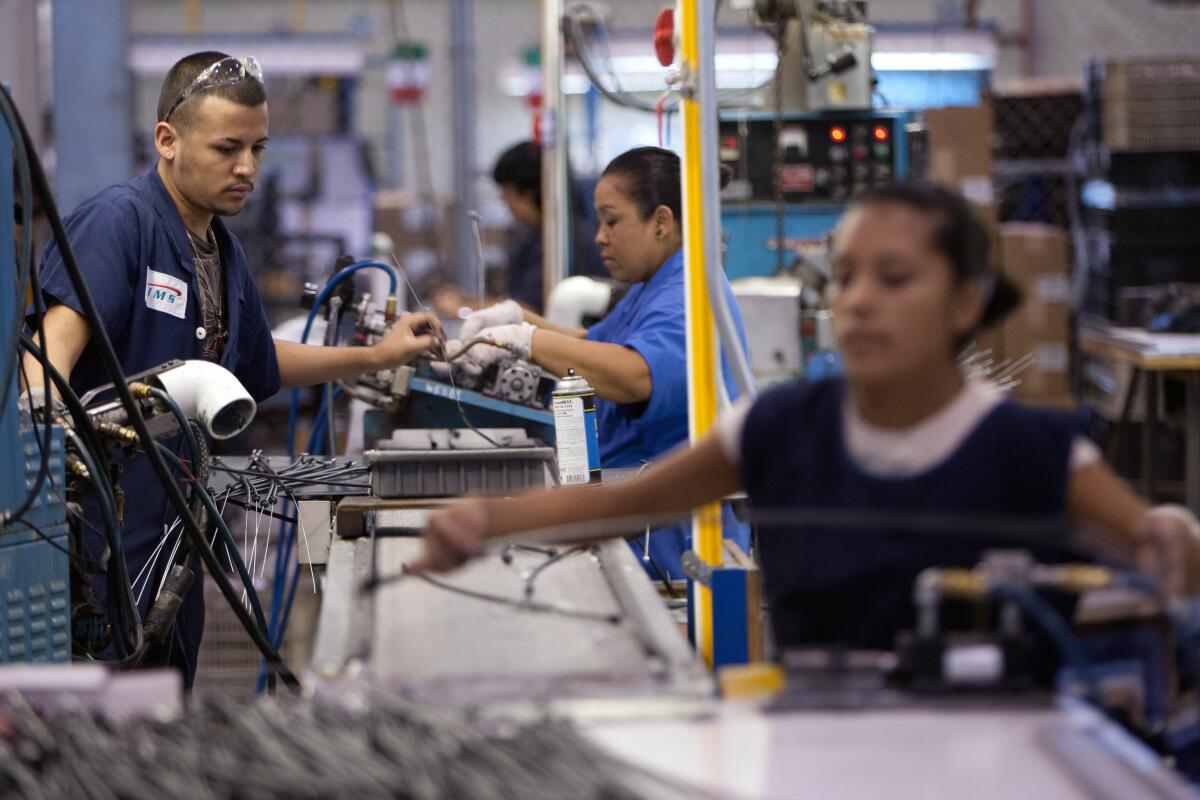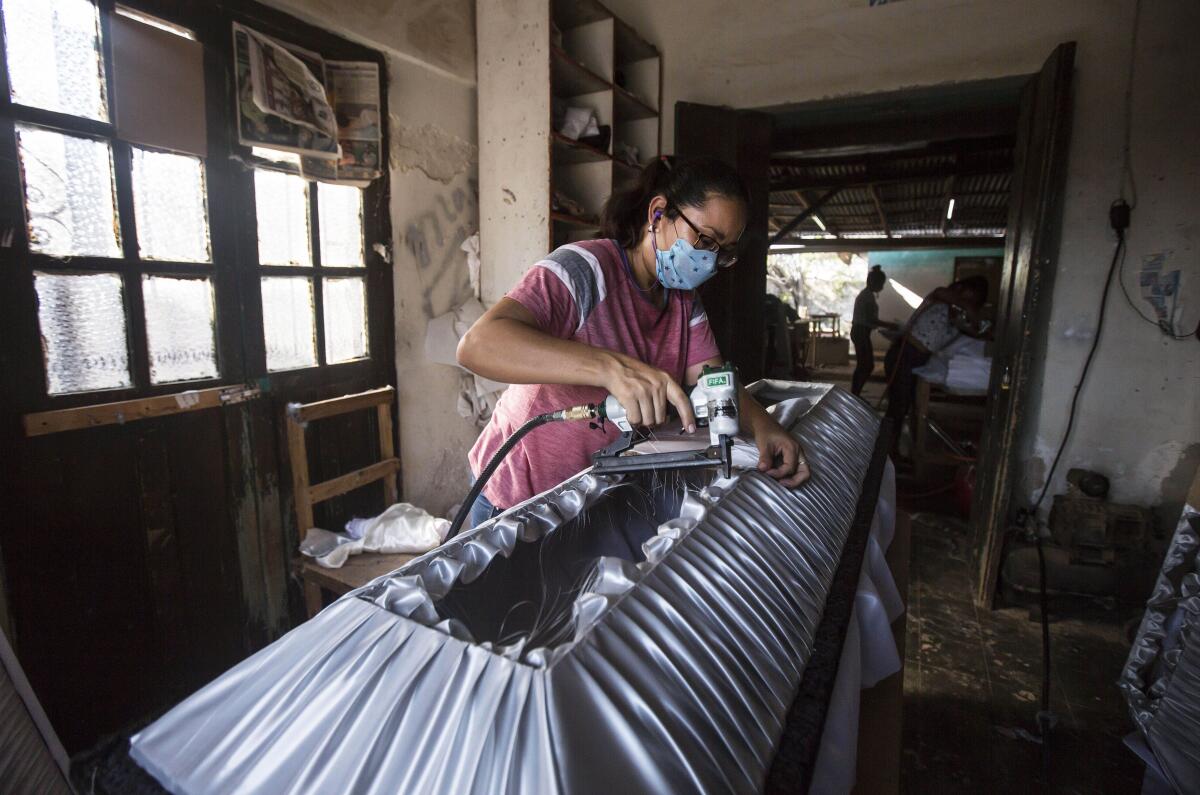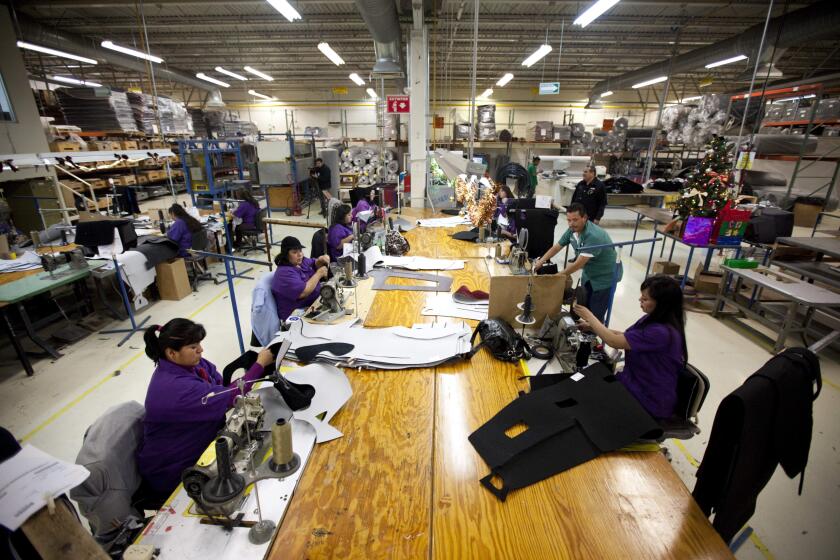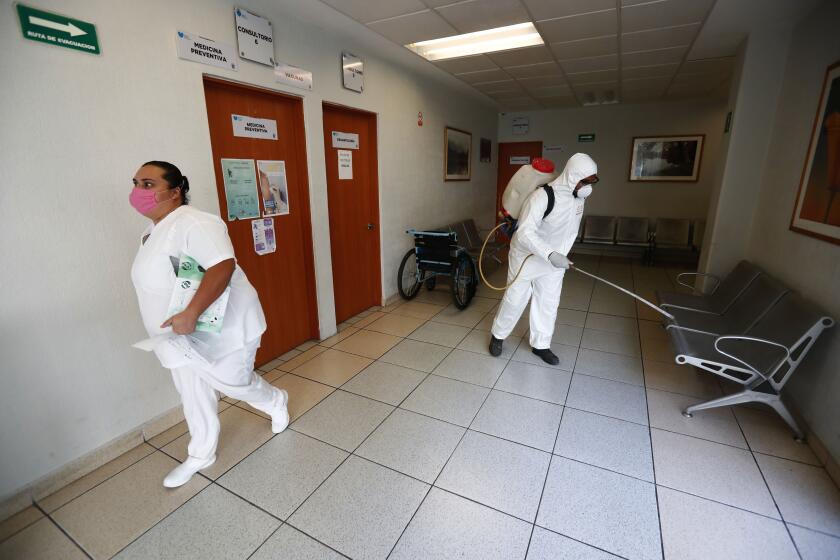The U.S. is pushing Mexico to reopen factories even as workers die of COVID-19

- Share via
TIJUANA — Even as COVID-19 deaths soar at factories in Mexico, the United States is sending a clear message: It’s time for plants that have stopped production to get back to work.
The U.S. government has mounted a campaign to persuade Mexico to reopen many factories that were closed because of the country’s social distancing guidelines, warning that the supply chain of the North American free-trade zone could be permanently crippled if factories don’t resume production soon.
“The destruction of the economy is also a health threat,” Christopher Landau, U.S. ambassador to Mexico, tweeted last week. “There are risks everywhere, but we don’t all stay at home for fear we are going to get in a car accident.”
Pressure has also come from American corporate chief executives — more than 300 of whom sent a letter to Mexican President Andrés Manuel López Obrador saying they were “deeply concerned” about the closing of factories — and from the U.S. Department of Defense, which has implored Mexico to reopen plants that make parts for defense contractors.
Mexican officials have begun to cave, despite warnings from health authorities here that reopening factories too soon could lead to widespread death.
Many of Mexico’s border factories are flouting orders to suspend operations, worsening the spread of the coronavirus.
Federal officials have agreed to allow automotive plants to reopen. And authorities in the border state of Baja California have lifted closure orders on at least 12 factories. Dozens of other plants that were supposed to shut down but never did have escaped serious sanctions from labor officials.
The debate underscores the increasingly global nature of modern manufacturing — materials might cross the border multiple times before a final product is assembled and sold — as well as the often conflicting approaches of governments in the face of the pandemic.
Businesses deemed nonessential have been ordered closed in Mexico and in the U.S., but the two countries have different definitions of what is considered essential, with Mexico embracing a more restrictive set of criteria.
That has left some factories still humming in the U.S. in need of crucial components because the plants that make them in Mexico have been forced to close.
“For some companies, the border might as well be shut down,” said Paola Avila, vice president of the San Diego Regional Chamber of Commerce.
Avila said 390 businesses that her group represents have asked Mexican officials to deem the work of their suppliers in Mexico essential. About a dozen of those factories, most of which provide parts that are exported to the U.S. for use in the manufacturing of medical supplies, have been allowed to reopen.

But the push has sparked anger in Mexico, especially in large foreign-owned factories along the northern border known as maquiladoras, whose finished products are all for export.
Workers at multiple plants have held protests in recent weeks over a rise in outbreaks and worker deaths.
“They are criminals who are only interested in their capital,” said a worker at a factory owned by Wisconsin-based Regal Beloit Corp. that has been closed since employees walked off the job April 15 after several of their colleagues died.
An April 18 letter from the company to employees confirmed three suspected COVID-19 deaths at the Juarez factory. Workers say five others have died since.
“They don’t care about us,” said the worker, who did not give his name because he was not authorized to speak to the media. The company, which produces motors for appliances, ignored signs of an outbreak for weeks, he said, and failed to provide even basic protective material such as sanitizing gel.
A spokesman for Regal Beloit lamented “the passing of our associates” but said the company does not know whether they contracted the disease at its plant.
Other factories where outbreaks occurred are preparing to reopen, including European Schneider Electric, a factory in Tijuana where at least three people have died, according to Baja California government officials.
A spokesman for the company, Venancio Figueroa, said it is deemed an essential business because it provides electrical products for hospitals. He emphasized that under new safety measures, workstations will be cleaned every two hours and employees will have their temperature taken before each shift.
Employees of an auto parts factory in Juarez where at least 14 workers have died say the plant is preparing to reopen and has erected partitions around workstations.
A spokesman for the company, Michigan-based Lear Corp., said that it is enacting “comprehensive health and safety measures” and that “any facility reopening date will be at the determination of government regulations.”
Across Mexico, medical worker have protested a lack of protective gear
Health officials here have cautioned against reopening the manufacturing industry too soon.
“No matter how much they need our maquiladoras, our industries, our businesses … we must avoid opening nonessential activities because we are in the most difficult part of the pandemic,” said Dr. Arturo Valenzuela Zorrilla, the state medical director in the Juarez area.
Mexico has 19,224 confirmed coronavirus cases and 1,859 deaths, according to federal officials, who predict that the most severe phase of the crisis is yet to come.

Governments around the world have had to weigh the economic costs of keeping businesses closed against the risks of the coronavirus spreading further.
That question is particularly knotty in northern Mexico, where maquiladoras are largely tax exempt and cheap factory labor largely benefits companies and consumers in other countries. The production of medical supplies, for example, has been deemed essential by the Mexican government, even though most of those supplies are ultimately shipped to the U.S.
“It’s an interesting question,” said Christopher Wilson, an economist at the Wilson Center think tank in Washington. “Should Mexican workers be putting their lives on the line to save people in the United States?”
One worker, 39-year-old Gustavo Morales, said he recently quit his job at a Tijuana factory after dozens of co-workers started falling ill. At least four died, he said.
The company, Ontex, which makes diapers and feminine hygiene products for export, did not respond to requests for comment. The factory is considered essential by the Mexican government.
Morales said he was terrified that he would bring the virus home to his family.
“They keep selling even though they know … that they are causing people to die,” he said. “But they don’t want to stop profits.”
Linthicum, a Times staff writer, reported from Mexico City. Fry, a staff writer at the San Diego Union-Tribune, reported from Tijuana, and Minjares, a special correspondent, from Juarez.
More to Read
Sign up for Essential California
The most important California stories and recommendations in your inbox every morning.
You may occasionally receive promotional content from the Los Angeles Times.














